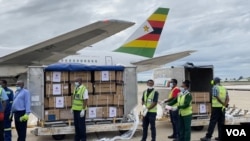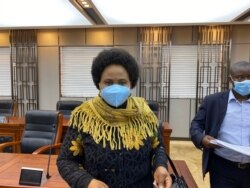Zimbabwean authorities say the more contagious coronavirus variant that was first spotted in South Africa now accounts for 61 percent of Zimbabwe’s new cases. Public health experts say they fear the variant could overwhelm Zimbabwe's collapsed health care system.
Information Minister Monica Mutsvangwa told reporters late Tuesday that officials would tighten lockdown enforcement because the variant had become more common.
“Results of the genomic sequencing recently conducted indicated the disappearance of the type of COVID-19 virus that the nation had in 2020," Mutsvangwa said. "There is now a 61% dominance of the new South African variant of the COVID-19 virus, which spreads faster and has a higher fatality rate. Accordingly, the nation now needs to be more vigilant than before and adhere to COVID-19 prevention and control measures. Our security personnel have therefore been directed to intensify monitoring and enforcement in order to enhance compliance.”
While the claim of a higher fatality rate of the variant has been contested, it has been proven to be more contagious.
Zimbabwe shares a border with South Africa, which authorities say helped the virus – and the variant – to spread.
While international health authorities are urging countries to heed COVID-19 measures, rights groups say some countries, like Zimbabwe, are using the restrictions to silence opposition.
The head of Human Rights Watch in southern Africa, Dewa Mavhinga, said Zimbabwe’s government should instead focus on helping those in need.
“The government needs to step in and support [those] who are in need and at risk of starvation," Mavhinga said. "That the government is intensifying the enforcement of regulations by the security forces is in itself not a solution. ... There is need for the government to ensure that there is no excessive use of force by the security forces as they monitor the lockdown. People should not be arrested and detained. Places of detention are already crowded and present a huge risk for the rapid spread of the COVID-19.”
If the variant’s spread is not brought under control, Zimbabwe’s public health experts say, it could quickly overwhelm the country’s hospitals.
Dr. Pamela Magande, president of Zimbabwe’s College of Public Health Physicians, said, "We already had a health system that was in need of improvement before COVID. I think we have a window for us as a country to make sure that our health system [gets] to where it is supposed to be. ... A good number of our district hospitals cannot even give our patients oxygen.”
Inoculation program
Zimbabwe on Thursday will launch its COVID-19 inoculation program, with the Chinese government having donated 200,000 doses of China’s Sinopharm vaccine. Zimbabwe’s government says that once enough vaccine doses have been acquired, it plans to eventually immunize 60 percent of the country’s estimated 14 million people in an effort to achieve herd immunity.
Zimbabwe had more than 35,400 confirmed infections and 1,418 deaths from the infection as of early Thursday local time, according to the Johns Hopkins University Corornavirus Resource Center in the U.S.







